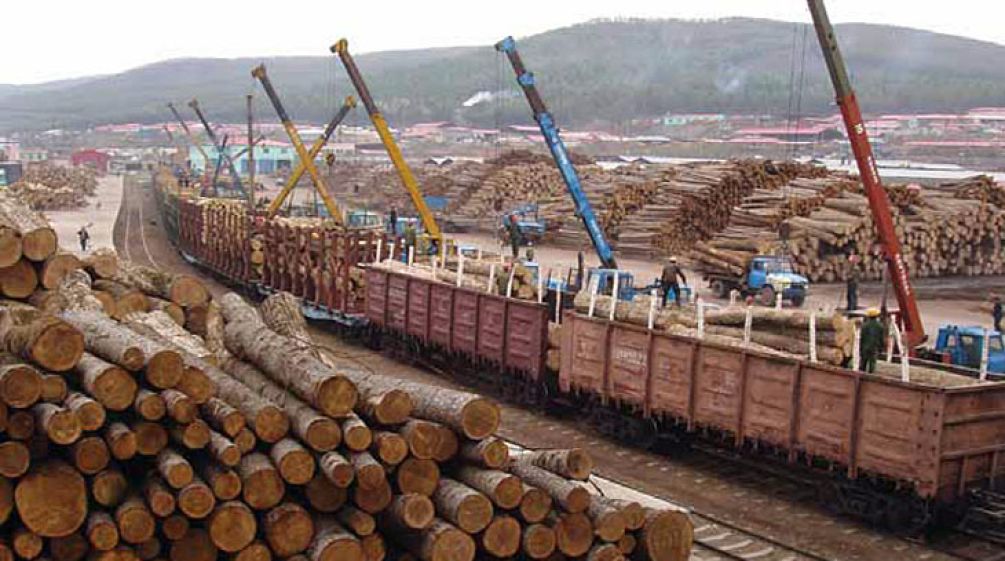China: the New Hotbed of Illegal Timber Trade

Dec 15, 2012
Over the past ten years, China has become the world’s number-one trader of illegally logged timber, according to a study published by the Environmental Investigation Agency (EIA) in late 2012. At the same time, major timber consumers such as the United States, the European Union and Australia have taken timber from illegal sources off the market.
According to the study, the world’s second-largest economy is responsible for the destruction of forests with a market value of several billion dollars every year. China’s forestry and timber management is marked by inconsistencies: On one hand, the country protects its own forests and subsidizes ambitious reforestation programs. On the other hand, numerous building projects and the increasing demand for fashionable wooden furniture among the affluent parts of the population have fostered a gigantic wood processing industry in China in recent years, leading to the import of enormous amounts of (tropical) timber – 180 million cubic meters in 2011 alone.
The EIA has been tracing the path of illegal timber in the producer countries Indonesia, Myanmar, Russia, Laos, Mozambique, Madagascar – and China – since 2004, and also studied the multi-billion dollar imports of illegal timber into China. Altogether, 52 percent of all timber imports into China in 2011 originated in countries with a high risk of illegal logging practices. China imported at the very least 18.5 million cubic meters of illegally logged roundwood and cut timber that year – and the EIA was focusing only on imports of unprocessed timber. China’s largest trade partners for the import of illegally logged timber are Russia (5.6 million cubic meters), Papua New Guinea (2.5 million cubic meters), the Solomon Islands (1.5 million cubic meters), Myanmar and the Republic of the Congo (500,000 cubic meters each), Equatorial Guinea (270,000 cubic meters) and Mozambique (183,000 cubic meters).
Consequences of illegal logging include the destruction of vital forest ecosystems, loss of income in the countries of the South, as well as an increase in corruption and armed conflicts in many regions. According to the World Bank, developing countries lose about 15 billion dollars in public revenue and taxes a year due to illegal logging. The World Bank estimates that every two seconds, the area of a soccer field is cleared illegally. To date, China’s efforts to halt illegal logging have been rather modest: Over the course of the past decade, the country signed memoranda with Indonesia, Myanmar and the U.S., as well as a bilateral agreement with the EU to coordinate prosecution and promote good governance with regard to forestry, yet these agreements have not succeeded in stemming the increasing imports of timber from illegal sources. After signing the memorandum with Indonesia, for example, China imported about one billion dollars’ worth of illegal timber from that tropical country. The Chinese government has not yet managed to take decisive action on explicitly prohibiting the trade in illegally logged timber. The matter is further complicated by the fact that the national forestry commission can only influence domestic forestry management, while a regulation of the international timber trade would be the responsibility of the trade and foreign ministries.
The EIA study therefore makes the following recommendations:
- The Chinese government should explicitly outlaw the import of illegal timber.
- A formal coordination committee consisting of officials from the trade and foreign ministries as well as the national forestry commission should be put in charge of ending the trade in illegal timber.
- Tree species that are threatened by extinction (such as certain types of rosewood and ebony) should be covered under the Washington Convention (CITES).
- The Chinese government should enact laws requiring the criminal persecution of corruption and bribery of foreign officials by Chinese companies.
- Timber-producing countries exporting to China should tighten their forestry and timber trade laws and strictly enforce regulations.











